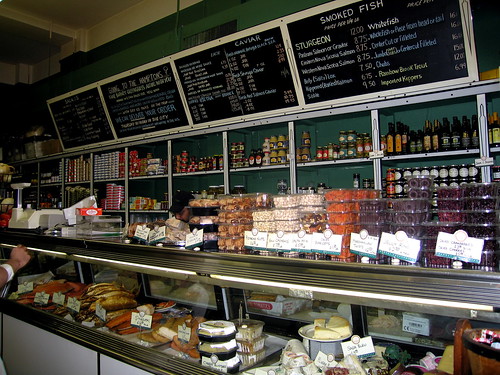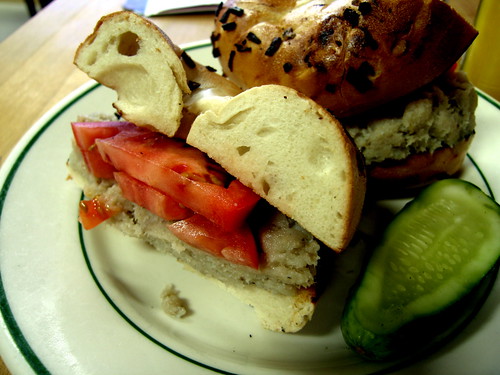Being Philip Roth at Barney Greengrass
I recently finished reading Philip Roth's "Operation Shylock" (a fun, if challenging, Roth read) and discovered, upon reaching the book's final chapter, that the last scene occurs at a place I knew lots about but never visited: Barney Greengrass. What follows is a brilliant section that perfectly describes the scene and the role it plays in Jewish lives:
"Smilesburger had chosen as the site for our editorial meeting a Jewish food store on Amsterdam Avenue, specializing in smoked fish, that served breakfast and lunch on a dozen Formica-topped tables in a room adjacent to the bagel and bialy counter and that looked as though, years back, when someone got the bright idea to "modernize," the attempt at redecoration had been sensibly curtailed halfway through. The place reminded me of the humble street-level living quarters of some of my boyhood friends, whose parents would hurriedly eat their meals in a closet-sized storeroom just behind the shop to keep an eye on the register and the help. In Newark, back in the forties, we used to buy, for our household's special Sunday breakfasts, silky slices of precious lox, shining fat little chubs, chunks of pale, meaty carp and paprikaed sable, all double-wrapped in heavy wax paper, at a family-run store around the corner that looked and smelled pretty much as this one did--the tiled floor sprinkled with sawdust, the shelves stacked with fish canned in sauces and oils, up by the cash register a prodigious loaf of halvah soon to be sawed into crumbly slabs, and, wafting up from behind the showcase running the length of the serving counter, the bitter fragrance of vinegar, of onions, of whitefish and red herring, of everything pickled, peppered, salted, smoked, soaked, stewed, marinated, and dried, smells with a lineage that, like these stores themselves, more than likely led straight back through the shtetl to the medieval ghetto and the nutrients of those who lived frugally and could not afford to dine a la mode, the diet of sailors and common folk, for whom the flavor of the ancient preservatives was life. And the neighborhood delicatessen restaurants where we extravagantly ate "out" as a treat once a month bore the same stamp of provisional homeliness, that hallmark look of something that hadn't quite been transformed out of the eyesore it used to be into the eyesore it aspired to become. Nothing distracted the eye, the mind, or the ear from what was sitting on the plate. Satisfying folk cuisine eaten in simple surroundings, on tables, to be sure, and without people spitting in their plates, but otherwise earthy sustenance partaken in an environment just about as unsumptuous as a feasting place can get, gourmandizing at its most commonplace, the other end of the spectrum of Jewish culinary establishments from the commodiously chandeliered dining salon at Miami Beach's Fountainbleau. Barley, eggs, onions, soups of cabbage, of beets, inexpensive everyday dishes prepared in the old style and devoured happily, without much fuss, off of bargain-basement crockery.

By now, of course, what was once the ordinary fare of the Jewish masses had become an exotic stimulant for Upper West Siders two and three generations removed from the great immigration and just getting by as professionals in Manhattan on annual salaries that, a century earlier, would have provided daily banquets all year long for every last Jew in Galicia. I'd see these people--among them, sometimes, lawyers, journalists, or editors I knew--taking pleasure, mouthful by mouthful, in their kasha varnishkas and their gefilte fish (and riveted, all the while they unstintingly ate, to the pages of one, two, or even three daily papers) on those occasions when I came down to Manhattan from Connecticut and took an hour off from whatever else I was doing to satisfy my own inextinguishable appetite for the chopped-herring salad as it was unceremoniously served up (that was the ceremony) at one of those very same tables, facing onto the trucks, taxis, and fire engines streaming north, where Smilesburger had suggested that we meet for breakfast at ten a.m. to discuss my book."
***
Ok, that was a crazy long passage to quote but who would you rather hear on the subject: me or a Pulitzer-Prize winner? (He'd never use the phrase "crazy long," for starters.)
That passage, though, helps explain why I spend so much time craving bagels and smoked fish and why my brother's favorite two words are "whitefish salad." We are generations away from the original culture that required the smoking of fish for survival---there's plenty of fresh fish to be had here in New York and in Boca Raton. Why do we still crave the smoked stuff? Is it in our genes?
I know non-Jews enjoy their "smoked salmon" but would non-Jews enjoy the sandwich I ordered when I sat down at a table along Barney Greengrass's back wall and asked for what Philip Roth asks for at the end of his book: "The chopped-cherring salad on a lightly toasted onion bagel. Tomato on the side. And bring me a glass of orange juice."
Ok, that's not exactly how I asked for it. I just said "with tomato" but you get the idea. And here it is:

I've never had chopped herring salad before. My family was a lox-spread/whitefish salad exclusive family. I saw my dad eat pickled herring once in my childhood: it came in a white cream sauce that made me gag just looking at it.
But as you can see in the sandwich above, chopped herring salad looks, on the surface, just like any other chopped fish salad--it could be tuna, it could be whitefish. But the taste! Wow the taste. How to describe? The shocking thing about it, at first, is that it's sweet. There's a real sweetness there and then a tanginess--a mix of sugar and vinegar that's unusual to encounter with fish. The texture is smooth and the tomato gives a nice tart edge to the experience, all balanced by the softness of the bagel. It's a cultural experience on a plate: Proust had his madeline, and we Jews have chopped herring. What are you gonna do? [Here I give a Jewish shrug and exit to "Anatevka" from "Fiddler on the Roof."]

